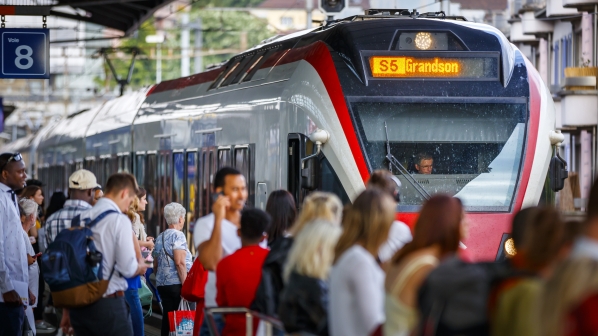MAKING rail the backbone of a sustainable mobility system by the end of the decade will help decarbonise transport and provide numerous benefits for society, the International Union of Railways (UIC) says in its 2030 vision published on October 29 ahead of the Climate Change Conference (COP26) in Glasgow.
In the vision, Design a Better Future, UIC also issues a call for action to policymakers and world leaders. UIC says that by 2030 railway stations and logistics depots will start to transform into multimodal mobility hubs and that car use will reduce by more effectively connecting cities.
“We are entering the decade of action for decarbonisation,” says UIC director general, Mr François Davenne. “This vision sets out how the transport paradigm must transform. At the COP, I will be calling for the support of world leaders to back rail as an essential ingredient for a net zero carbon transport system.”
The vision foresees a the world that is implementing the actions required to achieve the goals of the Paris Agreement. High-speed passengers and rail freight volumes have doubled, conventional passenger numbers have recovered and increased by 50%, and millions of new green jobs have been created. Diesel trains are rapidly being phased out, with a large-scale programme of main line electrification continuing and bi-mode operation a common practice, establishing rail travel is the background of a sustainable mobility system.
While transport currently accounts for a quarter of all global emissions, the vision foresees these beginning to decrease - a scenario UIC says is only possible with a thriving railway.
The scenario is based on four key transformations:
- transforming cities and connecting communities; transport-oriented development, lighter trains and green city logistics
- energy, technology and innovation with rail taking a leading role in the race to zero carbon and the renewables revolution
- intermodality and the seamless connection with innovations in physical and digital connectivity with other modes for a door-to-door service, and
- customer experience and the cultural transformation of rail towards a more customer-focused service to meet the changing needs and behaviours of freight and passengers.
UIC says stations are the obvious choice for mobility hubs in large cities,, and they can foster sustainable urban development. It says they are seamlessly connected to shared systems and are also preferred areas for urban development.
In the UIC vision, freight also plays a key role in the urban development with many short-distance rail freight designed to connect city hubs, while the vision foresees some passenger trains carrying goods with electric vehicles offering last mile transport.
A central objective of rail investments is to balance regional prosperity by creating better links for passengers in rural areas, smaller communities and towns.
UIC says that by the start of the new decade it hopes many countries will have been declared as net zero in terms of greenhouse gas emissions and are operating entirely with renewable energy. UIC’s vision is for no diesel-only trains to operate on electrified lines with alternative power solutions including green hydrogen and batteries in use. There are also plans to develop non-diesel work trains and freight trains which will help with the modal shift from road and aviation to rail.
The vision states that some countries will begin installing more dedicated renewable energy generation and storage on railway land, including on buildings and at the lineside. The sector should also use its influence as a consumer of electricity to buy and encourage the expansion and accelerate the development of renewable power and alternative green fuel generation. Regenerative braking will also be common in leading regions by 2030, the vision says. Technologies including hyperloop and permanent magnet synchronous traction systems are also being developed to provide energy-efficient train traction systems for high-speed lines connecting with conventional lines.
“Sustainability lies at the heart of rail activities, today more than ever before,” says Mr Patrice Couchard, chair of the Global Rail Sustainability Taskforce and director general, Stations at Belgian State Railways (SNCB).
“More than ever before, and in the context of the global coronavirus pandemic, the SDGs need to be on the to-do list for people and the planet as the blueprint for success,” says Mr Philip Turner, UITP head of sustainability. “Citizens, cities and the planet will be better off with more public transport. It improves our lives in so many ways and is the shot in the arm for our economies to fully rebound now and build us back better in the future."

